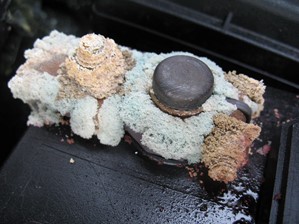Hey! This site is reader-supported and we earn commissions if you purchase products from retailers after clicking on a link from our site.
To be honest, proper maintenance and care for any system within your RV is a key to its longevity and your RV’s battery bank is certainly no exception to that rule. There are many full and part-time RVers that insist that an average battery used in an RV for alternative power sources such as solar will become too depleted to work properly after as little as two years. For that matter, there are a lot of those same folks that don’t believe in the reliability…or more importantly the viability of lithium battery banks for your RV as well.
Frankly, I don’t believe that…for either type of battery system. In fact, I have used lead-based batteries for several years and while I have had some minor problems with those batteries over the years, I have yet to find a problem I couldn’t solve without employing the proper care and maintenance regiment that is so often used in the course of your RV ownership. In this article, we’ll look at the best ways to maintain your RV battery bank and the best way to expand its lifespan.
I use lead-based batteries for my RV, what do I need to know?
Right now, lead-based batteries are generally the most economical batteries for RVs, and they are the type most commonly used for automobiles and recreational vehicles. However, these types of batteries do require periodic maintenance to prolong their life span.

One of the most common issues you may encounter with your battery is corroded terminals which can significantly shorten the life of your battery and its performance. However, if caught in a timely matter, this issue can be easily fixed with little effort and minimal tools and I will share with you how I have dealt with this problem in the past a little later in this article.
What causes this corrosion?
There are several factors that can cause this to happen, but it really boils down to four reasons why this may happen.
- Electrolyte Leakage. This problem only occurs with lead and acid-based batteries. Due to your batteries age and extended use, the electrolyte inside the battery will leak and accumulate on the battery terminals. It could also happen if you overfill your vehicle’s battery with battery water.
- Overcharging and over filling your battery. Overcharging your battery will cause these symptoms as the electrolyte will get charged overflowing to the terminals which in turn will cause corrosion. Similarly, overfilling your car battery with battery water will force electrolyte to leak through the battery vents, leading to corrosion at the terminals. Therefore, make sure that you fill in the right amount of battery water as instructed by the battery’s manufacturer.
- Copper clamp corrosion. Copper makes the best battery clamp since it’s a good electrical conductor and doesn’t corrode easily. However, over time, as the electric current passes through the copper terminals, it will form copper sulfate, which often leads to battery corrosion. Copper sulfate is identifiable on the terminals as a bluish precipitate. Copper sulfate, unlike copper, is not a good conductor of electricity, and the moment it forms on your terminals, you will begin experiencing problems starting your engine.
- Hydrogen gas leakage. Your RV’s battery works by turning acid into electrical current. Therefore, the moment hydrogen gas from your battery leaks and gets into contact with the atmosphere; it reacts with other substances in its surroundings and forms battery corrosion. Depending on the location of the corrosion, you should be able to diagnose your battery issues. For example, if corrosion occurs on your negative terminal, it’s a sign that your battery is undercharging, while if it occurs on the positive side terminal, it could mean that your RV’s battery is overcharging. In most situations, vehicle batteries suffer from undercharging, which is why you’re more likely to find corrosion on the negative side terminal.
What can I do to clean up this corrosion?
The best thing to do to combat corrosion is to keep a watchful eye out on your battery terminals and use wire brushes to clean them at the first sign of any corrosive buildup. While you can use small handheld brushes, I prefer brushes that will fit into my cordless drill as it saves time and a lot of elbow grease. Once you have the battery posts and connectors free of corrosion, spread some petroleum jelly such as Vasoline on the posts and reattach the cables to the battery.
- ⇒ S&R GERMAN DESIGN Wire Brushes Drill Bit Set with 6 mm/0.2" round shank in professional quality...
- → FLEXIBILITY AND RELIABILITY: The set includes 7 different wire brushes. This means you have the...
- → VERSATILE SET: 4 round brushes 38, 50, 75, 100 mm (1.5", 2", 3" and 4"), 1 cup brush 75 mm (3"),...
Last update on 2025-06-25 / Affiliate links / Images from Amazon Product Advertising API
What other preventative care can I do for my RVs batteries?
As I touched upon earlier, acid lead-based batteries require that you maintain the proper amount of water in them to work correctly. Too much water in them can cause damage and so can too little water. It’s also important to note that you can’t use just any water in them as well. Never use any water in them that is not distilled because tap water and bottled drinking water will cause mineral deposits to buildups within your battery cells, and this will greatly reduce the life of your RV battery or batteries.
Another item I recommend for protecting your battery is a good box to house them in while you travel. This is especially important when your camper battery is mounted on the tongue of your trailer. This will help to keep them away from the elements as well as road grime or any corrosives such as salt that may have been applied to the road surfaces.
- Standard battery box
- Fits Series 24 batteries (10-1/8" maximum height)
- Four cable openings, enlarged to 0.55" diameter
Last update on 2025-06-25 / Affiliate links / Images from Amazon Product Advertising API
Also, it’s especially important to periodically inspect your battery cables for any pinches or bare wire that could a short in your RV electrical system, or worse yet, fry your battery altogether. Naturally, some batteries are better than others, but with the proper care and maintenance you should expect your battery to last between five and ten years.
And finally, if you store your RV in cold climates, be sure to remove the batteries from your rig as part of your winterizing routine. Extremely cold weather will reduce the life of your batteries if they are not used periodically during the cold spells and that type of weather will reduce the charge on the battery and you may have to recharge them which in turn could lead to overcharging which will also damage them so it’s best to bring them indoors to prevent this scenario from occurring.
Final thoughts
In short folks, proper maintenance is the key to the longevity of any part of your RV. Sure, some parts will wear out over time due to your rig being in motion, but more often than not, regularly inspecting your RV’s components will be the thing that keeps those components in good working order. I also wrote a column on what to do if your battery won’t charge if you’re having issues there. If you need to replace your RV battery, make sure to check out Mike’s recommendations for the best RV battery.
Well folks, that’s it for this article. Stay safe, stay healthy and always remember, traveling the wide-open highways and byways in your RV should never be a chore. Keeping your RV well maintained will not only add to its longevity, but it will give you peace of mind as well.





